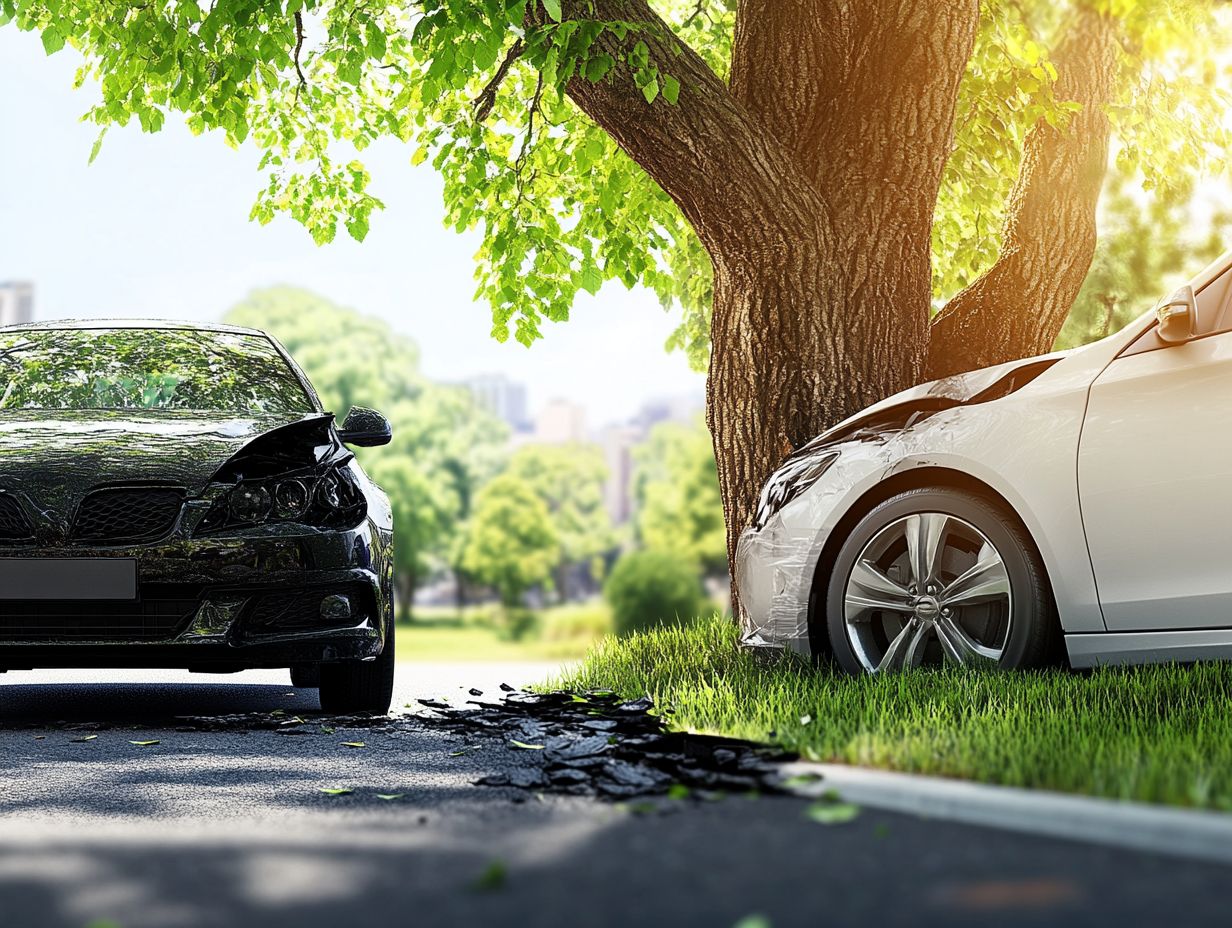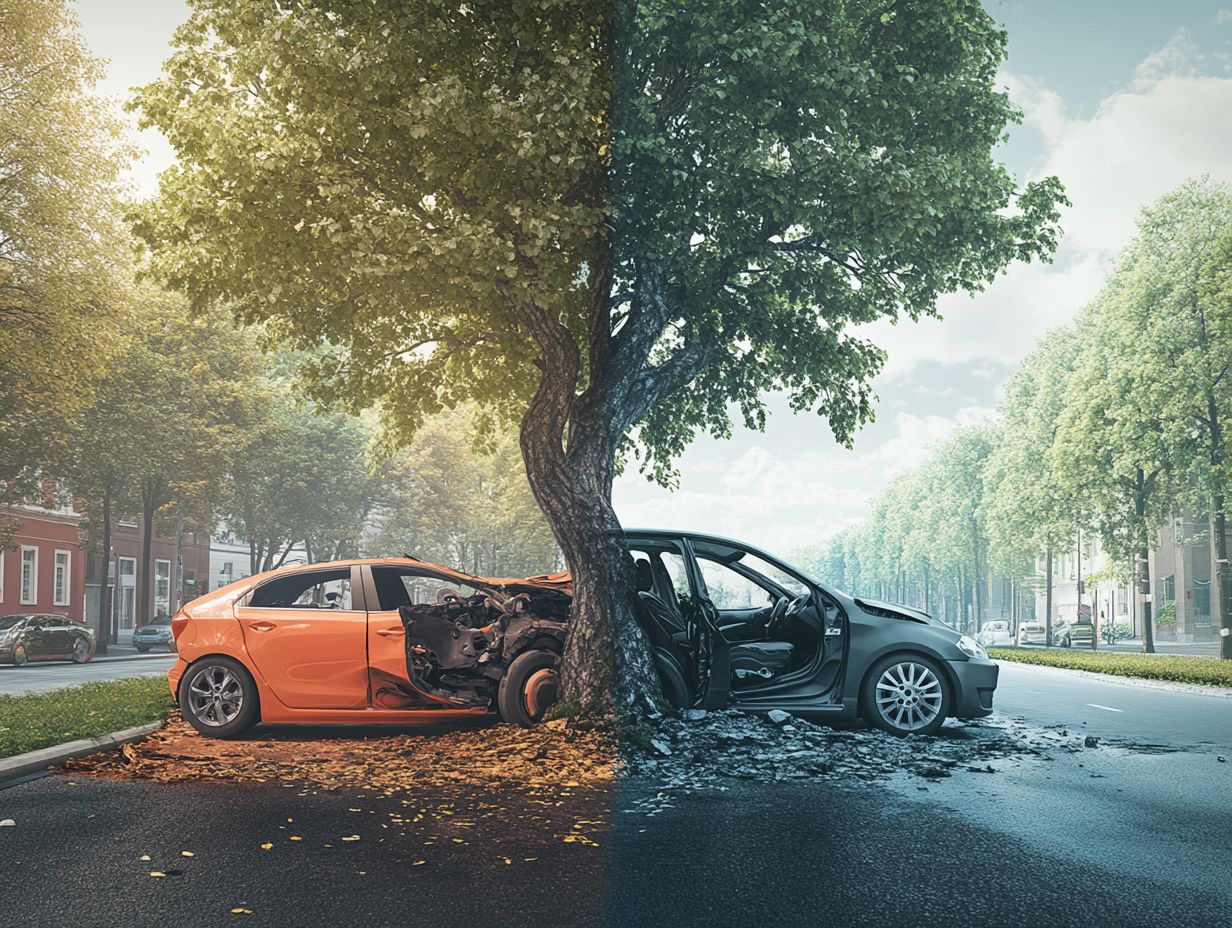How to Choose Between Comprehensive and Collision?
When it comes to car insurance, grasping the distinctions between comprehensive and collision coverage is important for making good choices. Each type of coverage serves a unique purpose, providing different benefits that can profoundly affect your financial security.
Considerations such as the value and usage of your vehicle, along with your personal financial situation, play a significant role in your choice.
This article will navigate you through the intricacies of each coverage type, empowering you to assess your individual needs and risks. By doing so, you ll be equipped to make the most advantageous decision for your specific circumstances.
Contents
- Key Takeaways:
- Understanding Comprehensive and Collision Coverage
- Factors to Consider When Choosing Coverage
- Benefits of Comprehensive Coverage
- Benefits of Collision Coverage
- How to Decide Between Comprehensive and Collision Coverage
- Frequently Asked Questions
- What is the difference between comprehensive and collision coverage?
- Do I need both comprehensive and collision coverage?
- Which coverage is more expensive?
- What factors should I consider when choosing between comprehensive coverage (protection against non-collision events like theft) and collision coverage (protection for car accidents)?
- Can I add comprehensive and collision coverage to my existing policy?
- Is there a deductible for comprehensive and collision coverage?
Key Takeaways:

- Understand the coverage differences: Knowing the distinctions between comprehensive and collision insurance helps you make informed decisions.
- Consider your circumstances: Think about your vehicle s value, usage, and financial situation when choosing between coverage options.
- Know the protections: Comprehensive coverage protects against non-collision incidents, while collision coverage covers collision damages.
Understanding Comprehensive and Collision Coverage
Grasping the differences between comprehensive insurance and collision insurance is vital for anyone who wants to protect their financial interests as a vehicle owner. Comprehensive insurance covers a broad spectrum of risks, including weather-related damage, car theft, and even collisions with animals.
Collision insurance focuses specifically on damage to your vehicle from accidents involving other vehicles or objects.
Choosing the right insurance coverage is crucial. It directly affects the premiums you pay and the financial protection you secure. Taking the time to evaluate various insurance providers and their specific policy options is essential to finding the best fit for your unique needs.
Definition and Coverage Differences
Collision insurance is tailored specifically to cover damage to your vehicle resulting from an accident, while comprehensive coverage protects you against unexpected incidents that don t involve a collision.
For instance, if you find yourself in a fender bender or a more serious crash, collision insurance typically handles the repair costs, minus your deductible (the amount you pay out of pocket before insurance kicks in). On the other hand, comprehensive coverage acts as your safety net for non-collision-related events, such as theft, vandalism, or natural disasters think hailstorms or falling trees.
A key difference lies in the claims process: collision claims usually require details of the accident and possibly police reports, while comprehensive claims might ask for documentation of damage from those unforeseen events. It s crucial for you to assess your driving habits and environment carefully, so you can determine which type of coverage will best suit your unique circumstances.
Factors to Consider When Choosing Coverage
When weighing the options between collision insurance and comprehensive coverage, a few vital factors demand your attention. Consider the value of your vehicle, your personal financial situation, and the premium costs associated with each insurance option.
Understanding your specific insurance needs is essential; it not only guides you in selecting the right types of coverage but also ensures you re sufficiently protected from potential financial loss due to vehicle damage or unexpected events.
Vehicle Value and Usage
Assessing your vehicle’s value and usage is essential when determining the right car insurance coverage. If you own a higher-value vehicle, you’ll likely need more comprehensive insurance options to protect your investment.
Keep in mind that premium costs can rise significantly with the value of your vehicle since insurers typically tailor coverage to match potential repair or replacement expenses. Your daily usage patterns whether you’re commuting to work or enjoying recreational drives will also play a role in shaping your insurance quotes. More frequent driving can increase the risk of accidents, which might lead to higher premiums.
Practicing safe driving habits, such as adhering to speed limits and steering clear of distractions, can help reduce these risks, ultimately influencing your premium rates. Therefore, it’s important to consider both the value of your vehicle and your daily driving behaviors when selecting the appropriate coverage to ensure you have the protection you need.
Personal Financial Situation

Your personal financial situation is a crucial factor when it comes to selecting the right auto insurance coverage; it directly influences the amount you pay before insurance kicks in in the event of a claim.
By evaluating your budget, you gain insight into the delicate balance between higher premiums and the potential for significant out-of-pocket costs following an accident. While comprehensive coverage might seem enticing with its extensive protections, it s vital to consider how those additional benefits align with your overall financial strategy.
Taking a close look at your current savings and expenses gives you the power to make informed decisions regarding collision coverage, ensuring you re not left financially vulnerable when unexpected events arise.
Thoughtful financial planning paves the way for effective protection, ultimately granting you peace of mind on the road!
Benefits of Comprehensive Coverage
Comprehensive coverage offers an extensive array of benefits, safeguarding you against non-collision incidents like car theft, weather-related damage, and even vandalism. This coverage ensures that you enjoy peace of mind no matter what unexpected situations may arise!
Protection Against Non-Collision Incidents
One of the standout benefits of comprehensive coverage is its exceptional ability to shield you from non-collision events, such as car theft and damage inflicted by damaging weather.
This type of insurance can spare you from significant financial turmoil in situations that collision coverage simply doesn t cover. Picture this: you stroll back to the parking lot, only to discover your vehicle has vanished! What would you do? With comprehensive coverage, you can recover your losses in such theft situations. And if a tree crashes down during a storm, wreaking havoc on your parked car, this protection ensures that you won t be left to face repair costs alone.
For those residing in areas prone to severe weather, comprehensive coverage becomes essential, as unexpected risks are an unfortunate part of daily life. Unlike collision coverage, which mainly safeguards against road accidents, comprehensive coverage offers a much broader safety net one that truly enhances your peace of mind as a vehicle owner!
Benefits of Collision Coverage
Collision coverage offers you vital financial protection by taking care of the expenses related to vehicle damage from car accidents. This coverage ensures that you can handle repair costs without facing undue financial stress.
Protection Against Collision Damage
Don t let a collision catch you off guard! Collision coverage is designed to protect you from unexpected expenses. It shields you from the financial fallout of collision damage and provides essential assistance for repairs when your vehicle is involved in accidents with other vehicles or objects.
This type of coverage is essential for anyone who spends considerable time behind the wheel. It alleviates the financial strain that often follows an accident. After an incident, your first priority should be ensuring everyone’s safety, followed by gathering crucial information like capturing photos of the damage and noting the details of the other party involved. Act fast! Reporting your claim to your insurer immediately is crucial to getting the help you need.
Understanding your insurance options is crucial. This knowledge gives you the power to make well-informed decisions regarding your coverage levels, potential deductibles, and overall protection, ensuring you are adequately equipped to handle unexpected mishaps.
How to Decide Between Comprehensive and Collision Coverage

When choosing between comprehensive and collision coverage, it’s essential to carefully review your needs. This careful evaluation gives you the power to make informed decisions that align seamlessly with your financial situation and driving habits.
Assessing Individual Needs and Risks
Assessing your individual needs and risks is essential when determining the right type of insurance coverage. This process enables you to identify your specific requirements based on factors like vehicle financing and your personal circumstances.
A thorough evaluation should include a careful review of your driving history, which can shed light on past claims and potential risks. Understanding your financial situation is equally important. This includes your income, savings, and existing debts, all of which dictate what kinds of coverage you can comfortably afford.
By analyzing these elements, you can prioritize necessary protections such as liability, collision, or comprehensive coverage ensuring you are adequately safeguarded without stretching your budget. Recognizing what is essential versus what is optional allows you to create tailored policies that align with both your lifestyle and financial goals.
Consulting with Insurance Provider
Consulting with an insurance provider is a crucial step in deciding between comprehensive and collision coverage. Agents can provide personalized advice and insurance quotes that align with your specific needs and preferences.
To make the most of these discussions, prepare a list of questions that will illuminate your options. For instance, you might want to ask about the differences in premium costs or the specific scenarios each type of coverage protects. Gaining a clear understanding of deductibles, limits, and potential discounts for bundled policies can also prove advantageous.
Engaging in these conversations not only clarifies coverage details but also gives you the power to make informed decisions. This ensures you choose a policy that fits your unique lifestyle and financial circumstances perfectly.
Frequently Asked Questions
What is the difference between comprehensive and collision coverage?
Comprehensive coverage protects your vehicle from non-collision incidents such as theft, vandalism, or natural disasters. Collision coverage, on the other hand, covers damages from accidents with other vehicles or objects.
Do I need both comprehensive and collision coverage?

It depends on your specific circumstances. If you own a new or valuable vehicle, it is recommended to have both coverages for maximum protection. However, if your vehicle is older and has a lower value, you may choose to only have one or the other.
Which coverage is more expensive?
Comprehensive coverage is typically more expensive than collision coverage. This is because it covers a wider range of incidents and is seen as a higher risk for insurance companies.
Contact your insurance provider today to explore the best coverage options for you!
What factors should I consider when choosing between comprehensive coverage (protection against non-collision events like theft) and collision coverage (protection for car accidents)?
Consider the value of your vehicle and your driving habits. Also, think about your budget and the potential risks your car may face.
Can I add comprehensive and collision coverage to my existing policy?
Yes, you can add these coverages to your car insurance policy. Your premium may rise as a result.
Is there a deductible for comprehensive and collision coverage?
Yes, both coverages usually have a deductible. This means you pay a set amount before your insurance covers the rest of the damages.






